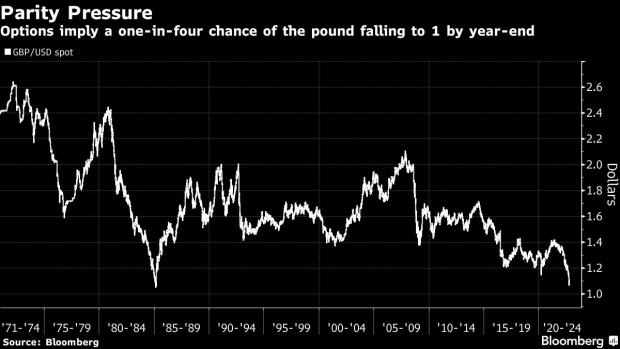Sep 30, 2022
$2 Trillion Asset Manager Ready to Buy the Pound at $1
, Bloomberg News

(Bloomberg) -- The pound will need to keep sliding to be worth just one dollar to attract Europe’s biggest asset manager to start buying it.
Amundi, which manages about $2 trillion in assets, is currently underweight on sterling against the dollar, but could flip its position if the two were worth the same. That’s a prospect Wall Street banks are calling for by the end of the year, even though the currency has recovered from a record low this week to trade around $1.10 on Friday.
The firm’s decision on its sterling position will be driven less by UK politics and more by the global picture, according to Federico Cesarini, the head of developed-market currencies at Amundi Institute. While he sees the UK government’s controversial fiscal plans as a trigger for the recent selloff, bigger considerations are the Federal Reserve’s interest rate path, the global economic outlook, geopolitics and valuations.
“The pound is cheap versus its fair value under various measures, but it has to be cheaper for us to consider shifting a position,” said Cesarini in an interview. “The pound falling around the parity level, all being equal, could be an attractive level for us to start considering going for a long sterling position.”
For Cesarini, the pound has had a perfect storm since the start of the year, making it unattractive even before UK Chancellor Kwasi Kwarteng sparked chaos in UK markets by announcing debt-fueled tax cuts a week ago. Amundi has kept an underweight position since the fourth quarter of 2021.
“Market reaction after the announcement of the new, unfunded tax cuts has been brutal,” he said. “For us, the trigger for a positive sterling position will not come from what the UK government will be doing with the fiscal expansion plan.”
The pound renewed its tumble Friday after the UK government signaled it’s sticking to its plans after a meeting with the nation’s fiscal watchdog, undoing earlier gains on bets it would succumb to pressure from markets.
Truss Won’t Change Fiscal Plan After UK Watchdog Meeting
There would be a few ways to make Cesarini less negative or to turn positive on the pound. Firstly, there must be a sign that the market anticipates an easing policy bias from the Fed, but that might not happen until next year, he said.
That leaves local interest rates and valuations to do the work. Either the Bank of England is willing to be aggressive with its interest-rate hikes to make the currency appeal to carry-trade investors, or the pound has to be cheap enough to attract buyers.
“We doubt the former will happen. The BOE will be aggressive, but much less hawkish than the market is expecting,” said Cesarini. “Therefore the pound will have to do the job.”
©2022 Bloomberg L.P.






